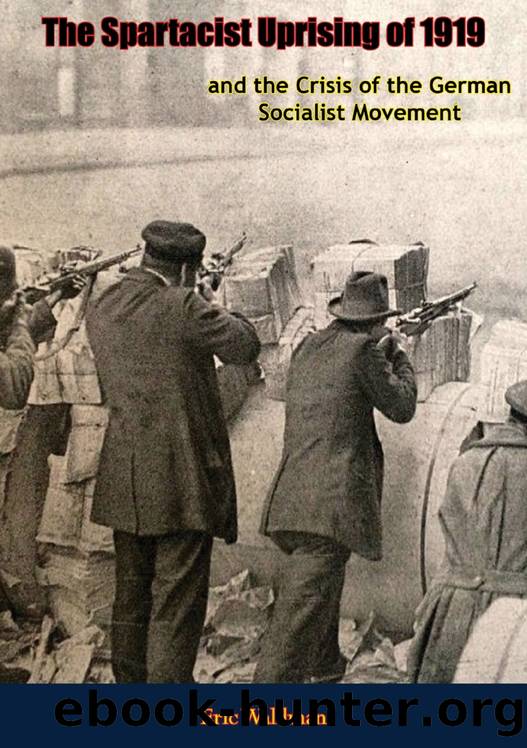The Spartacist Uprising of 1919 by Eric Waldman

Author:Eric Waldman
Language: eng
Format: epub
ISBN: 9781839745638
Publisher: Barakaldo Books
Published: 2020-06-24T16:00:00+00:00
4. The Spartacists and the January Uprising
The attitude of the Communists toward the uprising was not uniform. Their views toward an expansion of the mass protest demonstration on behalf of Eichhorn into a full-scale fight for the seizure of political power were divided as follows: (1) Karl Liebknecht and Wilhelm Pieck, the two Central Committee members who participated in the January 5 meeting of the functionaries of the Revolutionary Shop Stewards and of the Berlin USPD, strongly endorsed the uprising. (2) Rosa Luxemburg, Leo Jogiches, and the rest of the Central Committee of the KPD were opposed but believed that, regardless of their views, the new KPD had the moral obligation to support the revolutionary workers in their life and death struggle. (3) Karl Radek was strictly opposed to the uprising and urgently advocated discontinuing the hopeless fight before the revolutionary organizations suffered severe defeats which would affect their work for a long time to come.
Liebknecht and Pieck, in siding with the advocates of the uprising, had acted without the knowledge and approval of the Central Committee of the KPD, Liebknecht was severely criticized by Rosa Luxemburg for his unilateral action. How many of the rank and file members of the Spartacists concurred with Liebknecht’s endorsement of the all-out struggle for power is not known. During the days of the uprising, Liebknecht spent his time either in conferences with the Revolutionary Committee or with the dispersed groups of entrenched insurgents. He maintained little contact with the party leadership. On January 10, the Central Committee finally ordered Liebknecht and Pieck not to continue their participation in the Revolutionary Committee. This directive was meaningless by then since the committee had already suspended its meetings and had scattered in all directions.{397}
The attitude of most of the KPD leaders, including Rosa Luxemburg and Leo Jogiches, toward the uprising was determined by their conviction that political developments in Germany had not reached the point where an attempt to assume power should be made.{398} The decision of the January 5 meeting in favor of the all-out fight created a difficult problem for the Communist leaders. Should the KPD support the fight of the revolutionary workers in spite of the fact that the Central Committee did not endorse the uprising and was certain from the beginning that the insurrection had no real chance of realizing its objectives? Rosa Luxemburg’s views (which doubtlessly reflected the Party’s position on this controversial issue) were related by Clara Zetkin on the basis of a letter she had received from Leo Jogiches, who probably was Rosa Luxemburg’s closest collaborator during the January days.
Rosa Luxemburg saw the events—as significant and as hopeful as they were—not from the viewpoint of the assault against the Berlin City Hall. She related these events to the prevailing situation and especially to the degree of political maturity of the broad population of all Germany. On that basis, the overthrow of the Ebert government could be, for the time-being, only a propagandistic overall slogan of the revolutionary proletarians, and not the immediate objective of revolutionary struggles.
Download
This site does not store any files on its server. We only index and link to content provided by other sites. Please contact the content providers to delete copyright contents if any and email us, we'll remove relevant links or contents immediately.
The Fine Print (Dreamland Billionaires Book 1) by Lauren Asher(2550)
Fury of Magnus by Graham McNeill(2439)
The Last House on Needless Street by Catriona Ward(2382)
The Rose Code by Kate Quinn(2193)
A Little Life: A Novel by Hanya Yanagihara(2105)
Malibu Rising by Taylor Jenkins Reid(1904)
The God of the Woods by Liz Moore(1903)
Luster by Raven Leilani(1898)
Transcendent Kingdom by Yaa Gyasi(1852)
Moonflower Murders by Anthony Horowitz(1842)
The Lost Book of the White (The Eldest Curses) by Cassandra Clare & Wesley Chu(1683)
This Changes Everything by Unknown(1499)
The Midwife Murders by James Patterson & Richard Dilallo(1476)
The New Wilderness by Diane Cook(1438)
The Lying Life of Adults by Elena Ferrante(1426)
Wandering in Strange Lands by Morgan Jerkins(1415)
Written in the Stars by Alexandria Bellefleur(1392)
Ambition and Desire: The Dangerous Life of Josephine Bonaparte by Kate Williams(1383)
The Lying Life of Adults by Elena Ferrante;(1307)
